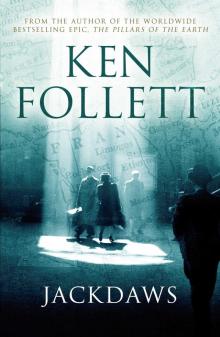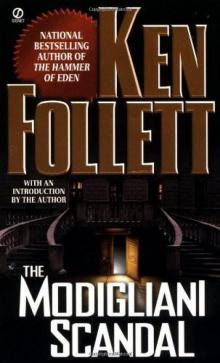- Home
- Ken Follett
The Evening and the Morning Page 31
The Evening and the Morning Read online
Page 31
“I assumed you knew but did not want to talk about it. Wynstan would have told Wilf’s family not to say anything to you. The servants probably don’t even know about it, although they seem to find these things out eventually.”
“Am I even married to Wilf?”
“Yes, you are. Inge was set aside, and Wilf married you. The church disapproves of the setting aside and of the marriage, but English law does not forbid either.”
“What am I to do?”
“Fight back.”
“It’s not just Inge, it’s Wynstan and Gytha and Wigelm and Milly and even Garulf.”
“I know. They form a powerful faction. But you have a magic weapon that will overcome them all.”
She wondered if he was going to turn pious on her. “Do you mean God?”
“No, though it’s always wise to ask for His help.”
“So what is my special weapon?”
“Wilf’s love.”
Ragna gave him a skeptical look. What did he know about love?
Aldred read her mind. “Oh, I realize everyone thinks monks are ignorant of love and marriage, but it’s not quite true. Besides, anyone with eyes can see how much Wilf loves you. It’s frankly embarrassing. He stares at you all the time. His hands are itching to touch you.”
Ragna nodded. After they were married, she somehow stopped feeling embarrassed by this.
“He adores you, he worships you,” Aldred went on. “That makes you stronger than all the others put together.”
“I don’t see what good it does me. Wilf has still brought his first wife to live next door to me.”
“That’s not the end, it’s the beginning.”
“I just don’t understand what you want me to do.”
“First, don’t lose his love. I can’t tell you how to keep it, but I’m sure you know.”
I do, Ragna thought.
“Impose your will,” Aldred went on. “Pick small fights with Gytha and Wynstan and Inge, and win small victories, then larger. Let everyone know that in a conflict, Wilf’s first instinct will always be to support you.”
Like the argument about Wigelm’s house, she thought, or the one about Dunnere the carpenter.
“And build up your strength. Develop allies. You’ve got me, but you need more—all you can get. Men of power.”
“Such as Sheriff Den.”
“Very good. And Bishop Elfheah of Winchester: he hates Wynstan, so make Elfheah your friend.”
“You sound as if you’re talking about war, not marriage.”
Aldred shrugged. “I’ve spent twenty years living with monks. A monastery is awfully like a big, powerful family: rivalry, jealousy, squabbling, hierarchy—and love. And it’s hard to escape from. I’m glad when I see trouble coming, because I can deal with it. The real danger comes from surprises.”
They sat in silence for a minute, then Ragna said: “You’re a good friend.”
“I hope so.”
“Thank you.” She stood up, and Aldred did the same.
He said: “Have you spoken to Wilf yet about Inge?”
“No. I’m still not sure what to say.”
“Whatever you do, don’t leave him feeling guilty.”
Ragna felt herself flush with indignation. “Why on earth not? He deserves to feel guilty.”
“You don’t want to become the person who makes him unhappy.”
“But that’s outrageous. He should be unhappy about what he has done to me.”
“Of course he should. But pointing it out won’t help you.”
“I’m not sure about that.”
They left the cathedral and turned in opposite directions. Ragna was thoughtful as she walked up the hill to the compound. She began to see sense in Aldred’s last remarks. She should not be a sad, defeated person this morning. She was Wilf’s choice, his bride, the woman he loved. She had to walk and talk like a winner.
She returned to her house. It would soon be time for the midday meal. She got Cat to comb and arrange her hair, then she selected her favorite dress, made of a silk the rich color of autumn leaves. She put on a necklace of amber beads. Then she went to the great hall and took her usual place on Wilf’s right hand.
Throughout the meal she talked in her usual way, asking the people around her what they had done that morning, joking with the men and gossiping with the women. She caught several looking at her in surprise: they would be the ones who knew what a shock she had suffered yesterday. They expected her to be grief-stricken. She was grief-stricken, but she was hiding it.
Afterward, she left with Wilf and walked by his side to his house. As usual, he needed little encouragement to make love to her. She began by pretending her usual enthusiasm, but soon found pretence unnecessary, and in the end was almost as satisfied as normal.
All the same, she had forgotten nothing.
When he rolled off her, she did not let him fall into his habitual doze. “I didn’t know you had a son,” she said in a matter-of-fact voice.
She felt his body tense beside her, but he made his voice casual. “Yes,” he said. “Garulf.”
“And I didn’t know that Inge was still alive.”
“I never said she was dead,” he shot back. It sounded like a rehearsed answer he had been holding in readiness.
Ragna ignored it. She did not want to get into a pointless argument about whether she had been lied to or merely told less than the whole truth. She said: “I want to know all about you.”
He was watching her warily. Clearly he was not sure what she was up to. He was asking himself whether to prepare himself to be berated or get ready to make excuses.
Let him wonder, she thought. She was not going to accuse him, but she did not mind if his conscience made him uncomfortable. “Your ways aren’t the same as those of the Normans,” she said. “I should ask you more questions.”
He could not object to that. “All right.” He seemed relieved, as if he had feared worse.
“I do not want to be surprised again,” she said, and she heard the hardness in her own voice.
He was clearly not sure how to take this. She guessed that he was expecting rage, or tears, but this was different, and he had no response ready. He looked bewildered and said simply: “I see.”
In the last few hours her anxieties had resolved into two burning questions, and she decided to ask them now. She felt he would be eager to give her what she wanted.
Ragna clasped her hands together to stop them shaking. “I have a couple of things to ask you right now.”
“Go ahead.”
“Where is Inge from? What’s her background?”
“Her father was a priest. In fact he was secretary to my father.”
Ragna could easily imagine the scenario: the children of two men who worked closely together, the son of one and the daughter of the other, spending much time in each other’s company, an adolescent romance, perhaps an unintended pregnancy, finally an early marriage. “So Inge does not have noble blood.”
“No.”
“When my father agreed to my marriage with you, he certainly foresaw that my children would be your heirs.”
He did not hesitate. “They will be.”
That was important. It meant she was the ealdorman’s official wife, not just one of a number of women of unclear status. She was not going to be made number two.
Needing to be sure, she pressed him. “Not Garulf.”
“No!” he said, annoyed to be asked twice.
“Thank you. I’m glad to have your solemn word on that.”
She was pleased to have extracted from him such an important promise. Perhaps he had never intended anything different, but the days were over when she took such things for granted.
He was mildly irritated at having been pushed up against the wall by her. In a vo
ice that suggested his patience was running out he said: “Anything else?”
“Yes, one more question. Do you intend to fuck Inge?”
He chuckled. “If I have any energy left.”
“It’s not a joke.”
His face hardened. “Something you need to be in no doubt about,” he said. “You will never tell me who I may or may not bring to my bed.”
Ragna felt as if she had been slapped.
Wilf said: “I’m a man, an Englishman, and the ealdorman of Shiring, and I do not take orders from any woman.”
Ragna looked away to hide her sadness. “I see,” she said.
He took her chin in his hand and turned her head back so that she was forced to look at him. “I will fuck anyone I like. Is that clear?”
“Very clear,” said Ragna.
* * *
The damage to Ragna’s pride was painful but she could live with it. The wound to her heart was worse.
She mended her pride by holding her head high and concealing her sorrow. She also remembered Aldred’s advice, and looked for an early opportunity to assert her authority. But nothing eased the hurt in her heart. She just nursed it, and hoped it would fade in time.
Garulf had received a gift of a ball, a piece of leather sewn with strong twine and stuffed with rags, and in January the adolescent boys of the compound began to play a rough game in which two teams competed, each trying to carry the ball into the opponents’ “castle,” a square marked on the ground. Garulf was captain of one team, of course, and the other was led by his friend Stigand, called Stiggy. They played between the stable and the pond, irksomely near the main gate.
The rowdiness was a nuisance to the adults, but Garulf was the ealdorman’s son, so a degree of tolerance was expected. However, as the days went by, Ragna noticed the game becoming violent, while at the same time the boys were more careless of inconvenience to passersby. It was worse when Wilf was away, and Ragna began to see it as a challenge to her authority.
Then one day when Wilf was away the ball struck the kitchen maid Gilda on the head, knocking her down.
Ragna happened to see it. She snatched up the ball to stop the game, then knelt beside Gilda.
Gilda’s eyes were open and after a moment she sat up, holding her head. “That hurt,” she said.
The boys were standing around, panting with effort. Garulf did not express regret about the accident or concern for Gilda, Ragna noticed. He just seemed irritated that his fun had been disrupted. That annoyed her.
“Sit still for a minute,” Ragna said to Gilda. “Catch your breath.”
But Gilda was impatient. “I feel foolish sitting here in the mud,” she said. She struggled to her knees.
Ragna helped her stand. “Come to my house,” she said. “I’ll give you a sip of wine to strengthen you.”
They walked to Ragna’s door.
Garulf followed them and said: “I want my ball.”
Ragna realized she was still holding it.
She ushered Gilda inside, then, holding the door, turned to Garulf and said: “What you want is a thrashing.” She went in and slammed the door.
She threw the ball into a corner.
She persuaded Gilda to lie on her bed, and Cat brought a little wine in a cup. Gilda soon felt better. Ragna established that she did not feel dizzy and could walk without assistance, then let her return to the kitchen.
A minute later Gytha came in, looking haughty. “I gave my grandson a ball as a gift,” she said.
Garulf was Gytha’s stepgrandson, but Ragna did not quibble. “So it came from you,” she said.
“He says you’ve taken it from him.”
“I have.”
Gytha looked around, spotted the ball in the corner, and quickly picked it up, then looked triumphant.
Ragna said: “Did he tell you why I took it?”
“Something about a minor accident.”
“A kitchen maid was knocked off her feet. The game has become dangerous.”
“Boys will be boys.”
“Then they must be boys outside the compound. I won’t allow the game to continue inside.”
“I will be responsible for my grandson’s behavior,” said Gytha, and she walked out, still holding the ball.
Not long afterward, the game began again.
Ragna summoned Bern, and the two of them stood outside watching. The boys saw them and tried to steer clear, but they could not keep the action within limits—that was the whole problem—and before long the ball came Ragna’s way again.
She picked it up.
Both Garulf and Stiggy approached her. Stiggy was a strong boy who threw his weight around to compensate for his stupidity.
Garulf said: “That’s my ball.”
Ragna said: “You can’t play ball inside the compound.”
Stiggy made a sudden move. He stepped forward and struck Ragna’s arm with his fist to make her let go of the ball. The blow hurt, and she lost her grip, but she caught the ball with her other hand and stepped back out of Stiggy’s reach.
Bern hit Stiggy a mighty punch on the side of his head, and Stiggy fell to the ground.
Bern looked hard at Garulf and said: “Will anyone else try to lay hands on the ealdorman’s wife?”
Garulf thought about it. His gaze went from the heavy body of Bern to the precious body of the ealdorman’s wife and back. Then he stepped away.
Ragna said to Bern: “Give me your knife.”
Bern’s belt knife was a large dagger with a sharp blade. Ragna put the ball on the ground, inserted the point of the knife under the stitching of the ball, and cut the thread.
Garulf gave a cry of protest and stepped forward.
Ragna pointed the knife at him.
Bern took a step toward Garulf.
Ragna continued to cut the threads until she had opened the ball sufficiently to let out all the stuffing.
Finally she stood up and threw the mangled leather into the middle of the pond.
She handed the knife back to Bern, handle first, and said: “Thank you.”
With Bern at her side she returned to her house. Her left arm hurt where Stiggy had punched her, but her heart sang with victory.
Wilf returned that afternoon, and not much later Ragna was summoned to his house. She was not surprised to find Gytha there.
Wilf looked bad-tempered. “What’s all this about a ball?” he said.
Ragna smiled. “My beloved husband, you should not trouble yourself about foolish squabbles.”
“My stepmother has complained that you stole a gift she had given to my son.”
Ragna was pleased, but concealed it. Gytha had allowed indignation to impair her judgment. She was onto a loser. She could not win this argument.
Ragna spoke in a light tone appropriate for something trivial. “The ball game has become too violent. One of your servants was injured by the ball today.”
Gytha snorted with derision. “She slipped in the mud.”
“She was hit on the head. Worse injuries would have followed. I told them to play outside the compound, but they disobeyed me, so I stopped the game and destroyed the ball. Really, Wilf, I’m sorry you’ve been pestered with this.”
He looked skeptical. “Is that really all that happened?”
“Well, no.” Ragna pulled up her left sleeve, showing a fresh bruise. “The boy Stiggy punched me,” she said. “So Bern knocked him down.”
Wilf looked darkly at Gytha. “A boy laid hands on the ealdorman’s wife? You didn’t tell me that part, mother.”
Gytha said: “He just tried to grab the ball back!” But the bruise told its own story, and Gytha was on the defensive.
Wilf said: “And what did Garulf do?”
“He looked on,” said Ragna.
“And did not def
end his father’s wife?”
“I’m afraid not.”
Wilf was furious, as Ragna had foreseen. “Stiggy shall be flogged,” he said. “A childish punishment for a childish man. Twelve strokes of the lash. But I don’t know what to do with Garulf. My son should know what’s right and wrong.”
Ragna said: “May I suggest something?”
“Please.”
“Make Garulf do the flogging.”
Wilf nodded. “Perfect,” he said.
* * *
Stiggy was stripped naked and tied facing a pole. The humiliation was part of the punishment.
Garulf stood behind him holding a leather whip, its end divided into three strips, each strip embedded with sharp stones. He looked resentful and unhappy.
Every resident of the compound was watching: men, women, and children. The penalty was intended to educate everyone, not just the offender.
Wilf, standing by, said: “Stiggy laid hands on my wife. This is his penalty.”
The crowd was silent. The only sound was the evening psalm of the birds.
Wilf said: “Begin. One.”
Garulf raised the whip and struck Stiggy’s naked back. The blow made a sharp snapping noise, and Stiggy flinched.
Ragna shuddered and wished she did not have to watch. But for her to leave now would appear weak.
Wilf shook his head. “Not hard enough,” he said. “Begin again. One.”
Garulf hit Stiggy harder. This time Stiggy gave a muted cry of pain. The whip left red marks on his white skin.
A woman in the crowd wept softly, and Ragna recognized Stiggy’s mother.
Wilf was unmoved. “Still too soft. Begin again. One.”
Garulf raised the whip high and struck with all his might. Stiggy screamed in pain, and drops of blood appeared where the stones had broken his skin.
The scream silenced the birds.
“Two,” said Wilf.
CHAPTER 17
February 998
dgar was angered by the idea of people stealing from Ragna.
He had not cared so much about Gab the quarrymaster cheating Ealdorman Wilwulf. Wilf had plenty of money, and anyway it was none of Edgar’s business. But he felt differently when Ragna was the victim, perhaps because she was a foreigner and therefore vulnerable—or perhaps, he thought wryly, because she was beautiful.

 The Pillars of the Earth
The Pillars of the Earth Eye Of The Needle
Eye Of The Needle Lie Down With Lions
Lie Down With Lions Winter of the World
Winter of the World Triple
Triple World Without End
World Without End Fall of Giants
Fall of Giants Jackdaws
Jackdaws Hornet Flight
Hornet Flight Whiteout
Whiteout A Dangerous Fortune
A Dangerous Fortune The Man From St. Petersburg
The Man From St. Petersburg A Column of Fire
A Column of Fire The Hammer of Eden
The Hammer of Eden On Wings of Eagles
On Wings of Eagles The Evening and the Morning
The Evening and the Morning The Key to Rebecca
The Key to Rebecca Code to Zero
Code to Zero Paper Money
Paper Money A Place Called Freedom
A Place Called Freedom The Modigliani Scandal
The Modigliani Scandal Triple (1991)
Triple (1991) A Dangerous Fortune (1994)
A Dangerous Fortune (1994) A Place Called Freedom (1995)
A Place Called Freedom (1995) Winter of the World (Century Trilogy 2)
Winter of the World (Century Trilogy 2) Code to Zero (2000)
Code to Zero (2000) On Wings Of Eagles (1990)
On Wings Of Eagles (1990) Storm Island
Storm Island Fall of Giants (The Century Trilogy)
Fall of Giants (The Century Trilogy) the Third Twin (1996)
the Third Twin (1996) The Modigliani Scandal (1976)
The Modigliani Scandal (1976) Night Over Water
Night Over Water